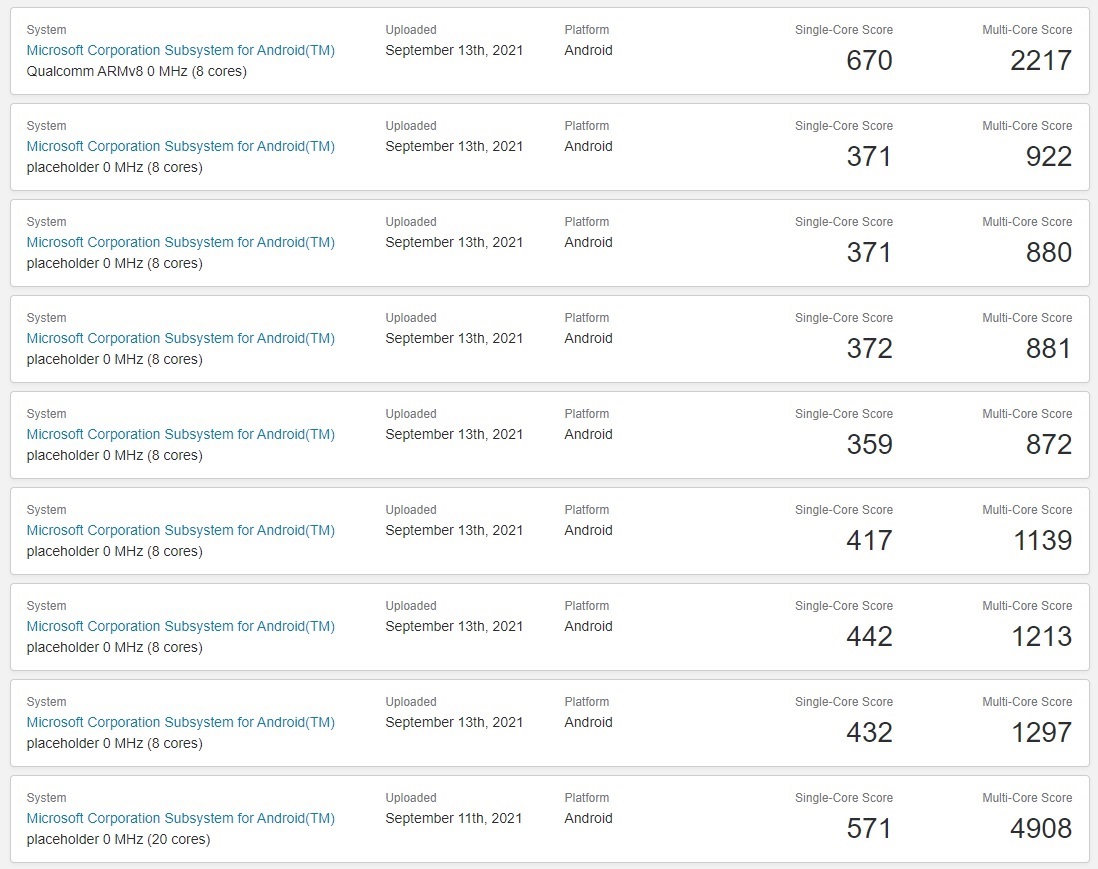
Microsoft Windows 11 will eventually have an entire subsystem that will support Android apps. The Android Subsystem’s Geekbench 5 results have leaked online.
Windows 11 will officially start rolling out on October 5. However, it will not have the much-hyped Android Subsystem. The company is actively testing the same, and performance results of the same have allegedly appeared online.
Android Subsystem Geekbench 5 results surface, revealing the need for powerful hardware for reliable performance:
Microsoft Windows 11 is certainly a huge evolutionary leap when it comes to the operating system. However, the OS is also way more welcoming when it comes to apps.
Windows 11 is able to run not just the traditional x86 apps, but it can also run Win32, PWA (Progressive Web App), UWP (Universal Windows Platform), and even Linux apps.
Microsoft's Android subsystem for Windows 11 spotted online ahead of launchhttps://t.co/Ert684lX4G pic.twitter.com/P5Bvzthv5e
— Windows Latest (@WindowsLatest) September 13, 2021
The latest operating system from Microsoft supports multiple platforms which app developers use to build apps. Needless to mention, Windows 11 could easily be the most progressive operating system that Microsoft has developed.
While Windows 11 supports multiple app categories and types, users are undoubtedly waiting for the OS to support Android apps. Although Microsoft has developed an entirely new subsystem for Android, Windows 11 will not support Android apps when it launches officially.

It seems Microsoft is still finetuning performance. Nonetheless, Geekbench 5 results of the Windows 11 Android subsystem have appeared online.
As expected, the Android Subsystem needs powerful hardware as the results get better with the number of CPU cores, as well as the amount of RAM, the PC has. Reports indicate, Windows 11 users who wish to run Android apps, could benefit from 16 GB RAM.
I am really curious about Windows Subsystem for Android (WSA) and more about the use unknown virtual machine technology to address issues with Android Open Source Project (AOSP) and eliminate the need for Google Play Store services. https://t.co/tM3Jd2mCK1
— Frederic Ocana
(@FredericOcana) September 13, 2021
Microsoft has slightly elevated the minimum system requirements needed to run Windows 11. However, several experts advise opting for speedier SSDs, decent Intel or AMD CPU, and 8GB or 16GB RAM to derive maximum benefit.
Despite the rather promising numbers, some experts are skeptical. It is possible that someone may have faked these listings.
Microsoft Windows 11 Store could distribute the Android Subsystem as and when its stable iteration is ready for general consumption:
Microsoft has confirmed that Windows 11 will not roll out with Android app support. The Android Subsystem will be available in the “coming months”.
It is not clear why Microsoft has delayed the availability of one of the most anticipated features of Windows 11. It is quite obvious that several PC users have long awaited the ability to natively run Android apps within Windows OS, without resorting to emulators.
Windows 11’s Subsystem for Android caught in Geekbench 5 benchmarks, and the results might surprise you https://t.co/i0PK8mIods
— OnMSFT.com (@onmsft) September 10, 2021
Incidentally, the Microsoft Store currently has an official listing for the Windows Subsystem for Android. The listing does not offer many details. Instead, it warns that the listing is “Microsoft Confidential – For testing purposes – Please do not take screenshots or communicate about the content.”
This strongly suggests Microsoft could offer the feature through the Windows 11 Store. The company is yet to officially use the redesigned store for distributing core features. However, several popular utilities are gradually getting their own listing.


